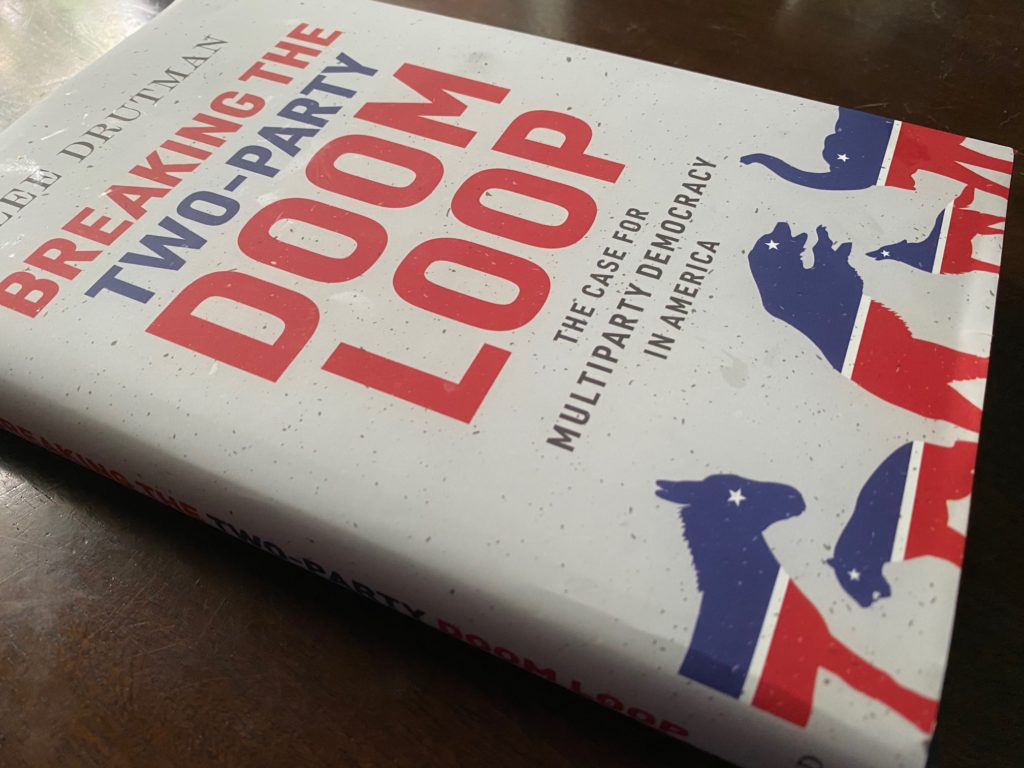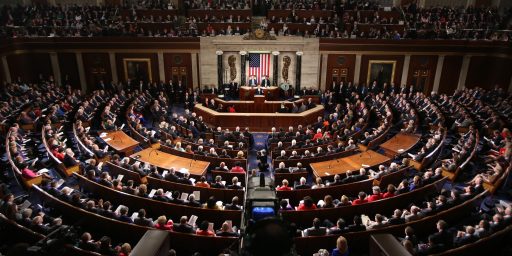Book Recommendation
Lee Drutman's Breaking the Two-Party Doom Loop

For those interested in both my ongoing critique of American political institutions as well as to amplify my discussion of the role of partisanship in our politics, I would recommend Lee Drutman’s Breaking the Two-Party Doom Loop: The Case for Multiparty Democracy in America from Oxford University Press. This book deals with several themes that I frequently write about here at OTB and reflects the kind of comparative politics-based reassessment of American politics that my co-authors and I hope to inspire in A Different Democracy.
Drutman has a Ph.D. in political science from UC Berkley and is a senior fellow in Political Reform at New American and also teaches as Johns Hopkins.
Anyone who had read my writing (ranting?) about binary choices in our party system can guess what the “two-party doom loop” means. Drutman does a good job of providing an overview of the problem as he sees it (an assessment that I generally share) that our system of single seat districts with plurality winner produces a problematic two-party system, including some discussion of why the primary system we use for nominations is problematic.
The book is accessible and readable for a non-academic audience despite its academic origins.
The spoiler alert is that Drutman recommends modest multiseat democracy using ranked-choice voting (also known as the single transferable vote) as used in the Republic of Ireland. While my personal preference is a Muli-Member Proportional (MMP) system as in Germany and New Zealand, Drutman’s RCV system has appeal. He persuasively argues (IMHO) that such a system would likely spawn a four-party system.
The book covers the basics well and is worth your time.






Sadly, both the Democratic and Republican parties seem to be far too entrenched to ever allow sensible proposals like this to see the light of day…what would ever convince members of those parties to voluntarily give up their political power? I’d love to know a way to get around that…
@An Interested Party: Reform is difficult, without a doubt.
As has been discussed here many times, as desirable and as logical as a switch from the current paradigm is, it ain’t gonna happen in our lifetimes.
In a poll out today, Trump is within the MOE in Arkansas. Arizona and Texas are in play. Mitch McConnell’s seat is in play. Romney marched for Black Lives Matter. Milley told Trump to fuck off. And the American people are singing along to NWA. Things feel possible.
@Michael Reynolds:
The Rs snuck a win in because of the vagueries of how the electoral college works.
Thought it was a golden key.
But it was cursed.
Trump will kill the Rs in 2020.
Steven, when I look at multi=party systems I see two or three mainstream parties and a collection of single issue parties, most very extreme. These small extremist parties are able to inflict their will on the majority by adding a few votes as a tie breaker.
You’ve made a lot of arguments about why a two party system is flawed and some about how a multi-party system is better in theory but I haven’t seen your argument as to why a multi-party system is better in actual practice.
@MarkedMan: Lots to be said, but I will start with this: would you prefer a system where there would likely be small, and sometimes extreme parties or would you prefer a system wherein those extreme ideas can infect and start to take over only one of two major parties (the system we currently have). Indeed, we came close to a situation with Bernie taking over the Dems after Trump had taken over the Rs.
And while there are scenarios wherein a small extremist party can extract some pound of flesh to get a bill passed or whatnot, there are also plenty of scenarios wherein the moderates can deal.
Regardless, what is better, a system that forces us all into one of two groups or a system that would allow for a better and more accurate representation of public opinion?
@Sleeping Dog:
Which someone invariably says every time a reform conversation emerges. And on the one hand, you are likely correct.
On the other, if we don’t think and talk about it, then it most definitely won’t come to pass.
@Steven L. Taylor: Your question is theoretical, but I look at Israel, where small racist and apartheid parties dictate foreign policy or, in another direction, countries like Italy which hasn’t been able to have an effective government for decades because the small parties render even a medium term consensus impossible.
I’m not saying I definitely think a multiparty system is a disaster, just that I haven’t seen much real world evidence of its superiority. But I don’t study this, as you do.
@MarkedMan: I almost preemptively raised Israel as it is typical counter-example. (I will also preemptively note that yes, Italy has a history of lots of government formation, which is another typial counter-example).
Israel has an extremely proportional system that elects its entire legislature in one national electoral district of 120 which allows a party to win seats with extremely small percentages of the vote (low single digits in some cases). It creates a highly fractionalized party system. It is not what I am suggesting.
RCV would likely create a number of modest sized parties (Drutman argues that we have natural four-party system–I am not 100% convinced of that number, but it is not unreasonable). MMP would likely maintain two large-ish parties and number of smaller ones.
The way the rules are written heavily influences these outcomes.
I think it is important to understand how unusual the US is in terms of its stable two-party system. I don’t want to overstate, but it is almost alone in this way (I think that there are some small Carribbean countries that may come close and there are maybe some historical examples that also come close).
Put another way: pretty much every other democracy in the world, from the most functional to the least has a more multi-party system than the US. Ergo, it can and does work and does not lead to Israeli politics, for example.
@MarkedMan:
And yes, it is theoretical in the sense that it is based in democractic theory and electoral studies.
In regards to the US, I am proposing the application of theory. Granted, any talk about the future is therefore hypothetical.
@MarkedMan:
One more thing: that is a mischaracterization. While I agree that some of the more extreme parties have been able to extract certain concessions, but basic Israeli policy towards the Palestinians, as well as its basic foreign policy, is driven by the larger parties (and has substantial public support).
@Steven L. Taylor:
I really want to be wrong about this, that reform of the system is possible. But the Constitution and entrenched interest groups built around the Constitution, plus Federalism make it a bridge too far.
The fact that the most fervent discussion about change is on forums like this is telling. The last governmental figure that I can remember raising these issues in a serious manner was Lani Guinier in the Clinton admin and that was in writings before Clinton nominated her. I wonder what type of crisis it would take to allow change?
One way political entities remain in power and avoid reform, is by making people think reform is impossible. Why try to change the system, when it cannot be changed?
But if the system could change in Eastern Europe under totalitarian communism, and under authoritarian rule in Latin America and Asia, then reforming the party system in America ought to be possible.
As of now, though, there is no large public demand for such change. Right now that’s the biggest stumbling block.
@Kathy:
This is not wholly fair. Due to how the Senate is constituted, a distinct minority of the population can legally block any fundamental change.
Extralegal change can, of course, occur. But this usually only happens with the support of the majority in the dying days of a brutal dictatorship. For obvious reasons, I don’t think this should be the preferred model of constitutional change.
@drj:
The changes in Roman law arguably accelerated the decline.
When brittle breaks it breaks hard.
@Steven L. Taylor:
Any thoughts on France’s Rassemblement national party (the old Front National)? They got about 1/3rd of the vote in their last presidential election, a figure that I find uncomfortably close to Trump’s hard-core base. In times of extremism, does one system manage better than another?
@drj:
While I whole-heartedly agree about the problem posed by the Senate, Kathy is 100% correct about the lack of public demand. And this is why I talk about it and am heartened to see things like Lee’s book and op/ed columns about reform in the NYT and elsewhere in recent years.
People don’t know what they don’t know and you have to start somewhere.
If your premise is “America is awesome and the problem is just the party I don’t like,” it is hard to get people to see the need for change. But, the reality is that while yes, it matters who governs, a lot of the problems are caused by the structure itself.
@Kit:
The National Front got about 1/3rd of the vote.
Trump is president.
Which is worse?
@Steven L. Taylor: Put another way: which system kept the nationalists out of power?
@de stijl:
This is going off on a wild tangent, but I’m not so sure about this.
Following the end of the Republic, the Romans lasted another half millennium in the west and a whopping one and a half millennia in the east.
Admittedly, there was no more Republic, but that was an aristocratic plaything anyway.
The average Roman was considerably better off under the first two centuries of the Empire than during the Republic. If only because there was no more civil war due to the competition for power and prestige among a bunch of wealthy aristocrats.
Not every Roman was a Cicero (who, by the way, became an obscenely wealthy aristocrat hmself before he was murdered on the orders of the Second Triumvirate).
@drj:
@Steven L. Taylor:
I think the Constitution doesn’t even mention political parties, so there’s wide latitude on that front. And next to reforming the Senate, which would be very difficult, having a multi-party system would be the next best thing.
Perhaps the largest groups who want some kind of reform in this area, are the true believers in small parties like the Greens and Libertarians. As I understand, simply getting a candidate in a ballot can be an exercise in frustration in many jurisdictions, requiring large mounts of effort, time, and money (especially for small organizations). That might be the place to start: require a simpler means of putting up a candidate in a ballot.
It may also be time to end the “large tent” argument, where allegedly diverse political viewpoints, within a limited spectrum, are given room under each of the duopoly parties. It may have been so in the past, and it may still be so in part in the Democratic Party, but Trump has shown how uniform the Republican Party really is.
@Kathy: Parties are not in the constitution (and the Framers didn’t really understand parties). But, of course, the issue is electoral rules.
Drutman’s RCV reform could be passed via federal legislation. My MMP preference might require an amendment.
@Steven L. Taylor:
I do think that there is a real public demand for DC statehood. Also (I would assume), because this is something that seems feasible. After all, new states have been admitted to the Union before.
Other reforms, however, would require a Constitutional amendment. (I might be mistaken, but I think proportional representation in Congress would require such a thing, no?)
I just don’t see it happening in the foreseeable future. Even such a no-brainer as the ERA didn’t make it, after all.
@drj: There is a difference between acknowledging the difficulty of reform and not talking about and acknowledging the difficulty of reform and still talking about it.
And as noted above, modest PR can be created without amendment. Although at the moment, such legislation is probably almost as unlikely as an amendment.
I will say this: if the Democratic majority (in terms of voters) is constantly thwarted by the Senate, the EC, and gerrymandering/geographic sorting, I think you will find an increase in reform talk.
@drj:
Uh, there was plenty of that.
The Julio-Claudian Dynasty, the very first, ended when Vespasian marched troops on Rome to depose Nero (who himself had risen to power when his mother murdered the sitting emperor Claudius, who himself rose to power when Caligula’s bodyguard murdered Caligula). Vespasian’s dynasty ended when his younger son, Domitian, was assassinated.
Then came a period that was good on many counts, known today as the era of the Five Good Emperors* (they were six, but one wasn’t any good). Gibbon raves about this period, BTW.
But it didn’t last forever, alas. There were more civil wars later on, ending in what is now known as The Crisis of the Third Century .
This was eventually ended when Diocletian established the Tetrarchy, which led to further civil wars when it unraveled shortly after he retired.
Now we’re fully off topic.
* Traditionally: Nerva, Trajan, Hadrian, Antoninus Pious, and Marcus Aurelius.
@Steven L. Taylor: My problem with RCV is that in our system, the process will ultimately redound to a vote for either R or D. It’s possible that over a few–I would suggest 3 or 4–generations, other parties might arise that could become the “choice” but don’t see that it axiomatically evolves that way.
While the system structure keeps having to have a candidate arrive at 50% + 1 to win, that system will more likely stay a binary choice system. Or am I missing something? (And I have to assume that I am–I an ignint cracker, but not a stupid one.) With Libertarians as the most enduring third party of my lifetime–and managing about 2 or 3% at the polls under the best of circumstances (meaning that the L vote eventually becomes a D or an R) where does the groundswell that creates even one additional party to mix the balance come from?
@Just nutha ignint cracker:
Mexico has a similar system, except candidates all over can win by plurality. That is, the winner is the one with the most votes, even when short of a majority. We have three major parties, a few sizable ones that can join electoral coalitions to good effect, and some small ones no one takes seriously.
But Mexican democracy dates, generously, only from 1997, and most people will tell you from 2000.
@Kathy:
I wouldn’t exactly say plenty. The first two centuries of the Empire are the period of the Pax Romana for a reason.
@Just nutha ignint cracker: It would take a few electoral cycles for change to be evident and a little while for new parties to form and grow. But it wouldn’t take 3 or 4 generations.
Once people learn the new rules, they adapt. It is like innovations or rules changes in sports.
@Just nutha ignint cracker: Put another way: right now the only viable path to power is with a D or R by your name. So power-seekers have to get the D or R.
Once you change the rules and power-seekers have other pathways to power, their behavior will change.
Likewise, voters know now that voting Green is voting for a loser. Change the rules and once voters understand that voting Green could actually lead to winning, their behavior will change.
@Steven L. Taylor:
To me, that’s the most interesting part of the argument. As is all too typical, I’m much more familiar with the atypical than the typical. (Heh.) Is there any good analysis of well functioning governments, especially ones with an ethnically diverse population?
@Kit: This book certainly brings up the validity of a third party, maybe a fourth and fifth. There are plenty of people who are disenchanted with the far right and far left location that both parties are in. No one speaks for the middle class, working folks who obey the laws, work hard, and feel left out and powerless when it comes to the mainstream news, court decisions, and legislation. That is a huge number of people.
Term limits!
@Tyrell:
While I understand the visceral appeal, term limits are a terrible idea.
@Steven L. Taylor: It has its good points and bad points. We had a House of Representatives member who ran on the issue of term limits. They then stayed in the House for nine terms! There is a lesson there somewhere.
Thanks for your attention and reply.
@Steven L. Taylor:
Indeed. I was a member of the permanent non-partisan staff for a state legislature after term limits had been in place long enough to bite. Government didn’t get smaller, and it didn’t get simpler. But there was a large transfer of effective power to the leg staff, to the permanent executive-branch bureaucracies, and to the lobbyists. All of which are unelected.
@Tyrell:
The research on the subject suggests that it has almost all bad points. Term limits don’t improve representation but they do empower lobbyists and staff. (Indeed, what @Michael Cain said).
Thank you for this book recommendation. It’s immensely readable and the only reason I didn’t finish it immediately is because I got distracted by how it cohered my own ideas in a way that demanded I go write it down instead.